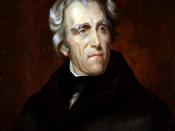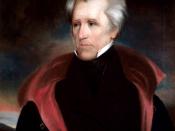During the presidency of Andrew Jackson, some may argue that he did not up hold to political democracy, the practice of the supreme power being held by the people and individual liberty, the ability for people to possess rights and be free. Incidents such as the Indian Removal Act, Southern Tariffs, Nullification Crisis, and the Gag Rule are some examples that help support that Jacksonian Democrats hardly protected the Constitution or its people.
The Nullification Crisis started when the charter of the bank went up and Congress approved of the recharter of the bank in 1832. Jackson vetoed it on the grounds that it was a private monopoly, it was immune to state taxes, and it gave to much power to too few people. He was against the bank personally because he felt that it catered to the rich and not the common man as supported in Document B.
The veto stood, because Congress did not override it. To kill the bank, Jackson removed federal money and put it into state banks instead. The area of debate is that in doing this, the common people gained power, but the currency system wasn't regulated well and went out of control, causing economic instability. The Specie Circular is another example of Jackson's bad judgment. This provided that after August of 1836, only gold or silver would be accepted as payment for federal lands. He sought to end the monopoly of public lands and the "ruinous extension" of bank notes which came about from the Deposit Act, but it only damaged the economy more. This was another disaster, which was soon after, overturned by Congress. Jackson didn't uphold to political democracy with these incidents. Much damage came about to the economy from his decisions.
The idea of political democracy fell apart with...


